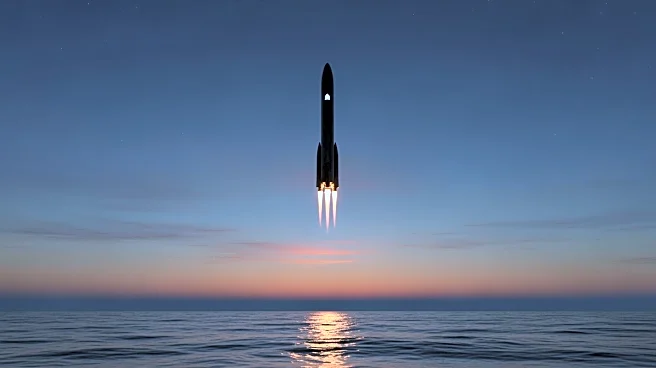What's Happening?
Blue Origin has successfully launched its New Glenn rocket, carrying NASA's ESCAPADE Mars mission from Florida's Space Coast. This marks a significant milestone as Blue Origin managed to recover the booster
stage after separation, a feat previously achieved only by SpaceX. The launch is notable for being the first Mars mission in over five years and involves two identical orbiters designed to study Mars' magnetic environment. The mission aims to provide insights into how Mars lost its thick atmosphere. The New Glenn rocket, developed by Blue Origin, is a two-stage heavy lifter capable of hauling substantial payloads to low Earth orbit, and features a reusable first stage.
Why It's Important?
The successful launch and recovery of the New Glenn rocket's booster stage is a critical step for Blue Origin in its competition with SpaceX. This achievement not only demonstrates Blue Origin's capability in space exploration but also signifies progress in reducing costs through reusability. The ESCAPADE mission's novel trajectory could pave the way for more flexible Mars exploration, potentially benefiting future human settlement plans. The success of this launch enhances Blue Origin's reputation and positions it as a formidable player in the private spaceflight industry.
What's Next?
The ESCAPADE mission will follow a unique trajectory, heading to the sun-Earth Lagrange Point 2 before transferring to Mars when the next launch window opens. This approach could allow for more efficient scheduling of future Mars missions. Blue Origin plans to continue developing the New Glenn rocket for various missions, including potential human flights. The company aims to build a road to space for the benefit of Earth, with New Glenn playing a pivotal role in this vision.
Beyond the Headlines
The successful recovery of the New Glenn booster stage highlights the growing importance of reusability in space exploration. This development could lead to more sustainable and cost-effective space missions, encouraging further investment in private spaceflight. The ESCAPADE mission's focus on Mars' magnetic environment may provide valuable data for understanding planetary atmospheres, contributing to broader scientific knowledge.









